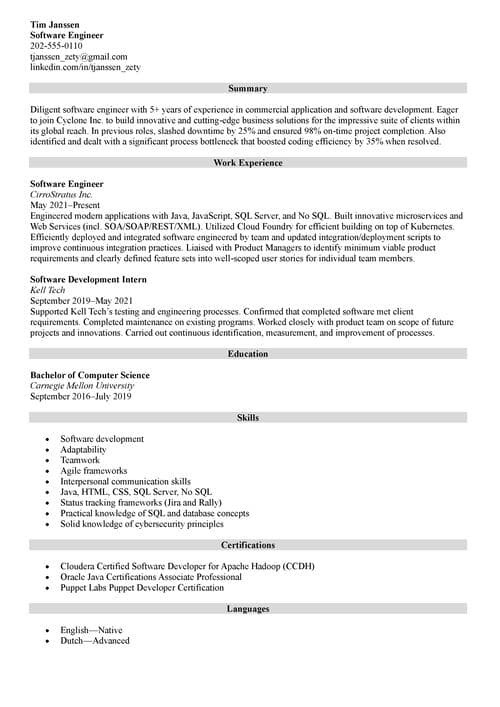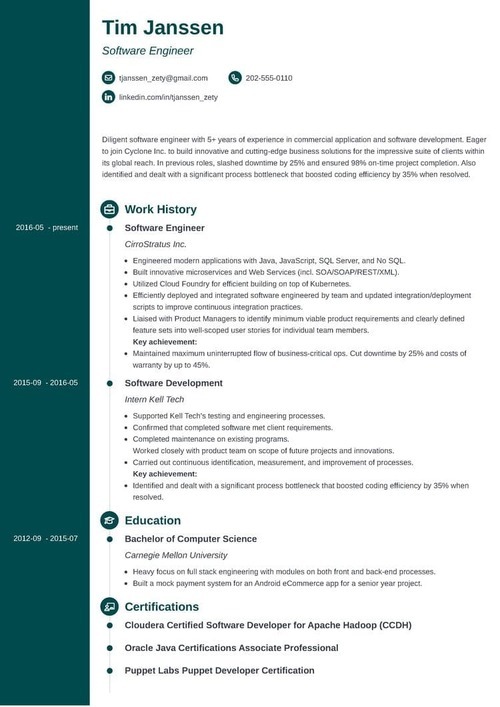What Is a Resume? Definition, Purpose & Key Parts
Create Your Resume NowYour resume is an essential item in your job application and an absolute go-to for recruiters to get to know you as a potential candidate. However, it may seem overwhelming to grasp the resume definition, what it aims for, and what it consists of, especially if this is your first job search.
Learn what a resume is and what information it requires to be complete and to secure you an interview.
This guide will show you:
- What is a resume (definition included!)
- What is resume purpose in a job search.
- An example of a resume to understand what kind of details you need to include.
- Four types of resumes and the difference between them.
Want to save time and have your resume ready in 5 minutes? Try our resume builder. It’s fast and easy to use. Plus, you’ll get ready-made content to add with one click. Explore our free resume templates and start building your resume today.
Sample resume made with our builder—See more resume examples here.
What Is a Resume for a Job
A resume (also spelled résumé) is a formal document a jobseeker writes to present their qualifications, background, and skills for the job they want. The main parts of your resume include a summary, work experience, education section, skills, and other relevant information.
And that’s the most basic and traditional resume definition. Now, let's have a look at what our career expert Caio says about the resume definition:
What Is the Purpose of a Resume
It’s a common misconception that a resume will land you a job. This is not its main purpose, especially since only 3% of resumes result in an interview. So, allow me to define resume purpose.
A resume aims to introduce yourself to employers, present your qualifications, and secure an interview. Writing a resume aims to showcase your experience, education, and skills in a standardized format that is easy for recruiters to read.
In other words, your resume is the first thing your future employer will encounter. It’s the very first impression you make. After that comes a cover letter and your online presence. And only then, if you’ve prepared all three right, you’re getting invited for a job interview.
But is there only one format, style, or type of resume to choose from? No. Let’s find out which one would work best for you.
Pro Tip: In the US, you can use two types of documents to apply for a job. One of them is a resume. The other is a CV. What is a CV vs Resume difference? It’s the purpose. You use resumes to apply for traditional jobs, like accounting, IT, or communications. But in the US you use a CV for academic applications, like research positions, fellowships, or grants.
What Resume Should You Choose?
There are three resume formats. Each of them has its specific structure and purpose. One of them depends on your employment history, the other on your skills, and there’s one that will focus on both of these aspects. So let’s see them all!
Reverse-Chronological Resume
Reverse-chronological resume is a classic format known to most recruiters and your best choice in most situations. It puts your recent or current experience upfront and promotes your proudest achievements going back in time.
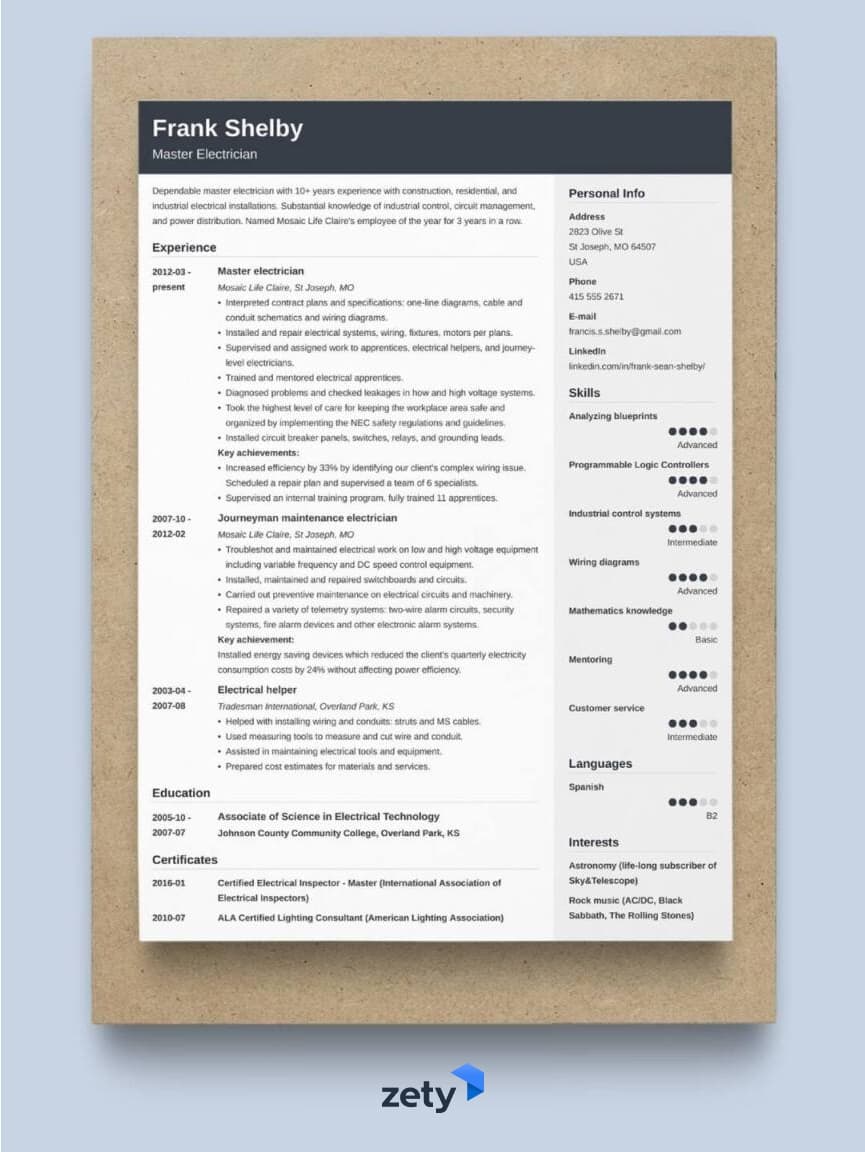
Functional Resume
Functional resume is a format that focuses on skills rather than work history. It’s ideal for career changers and those with gaps in employment.
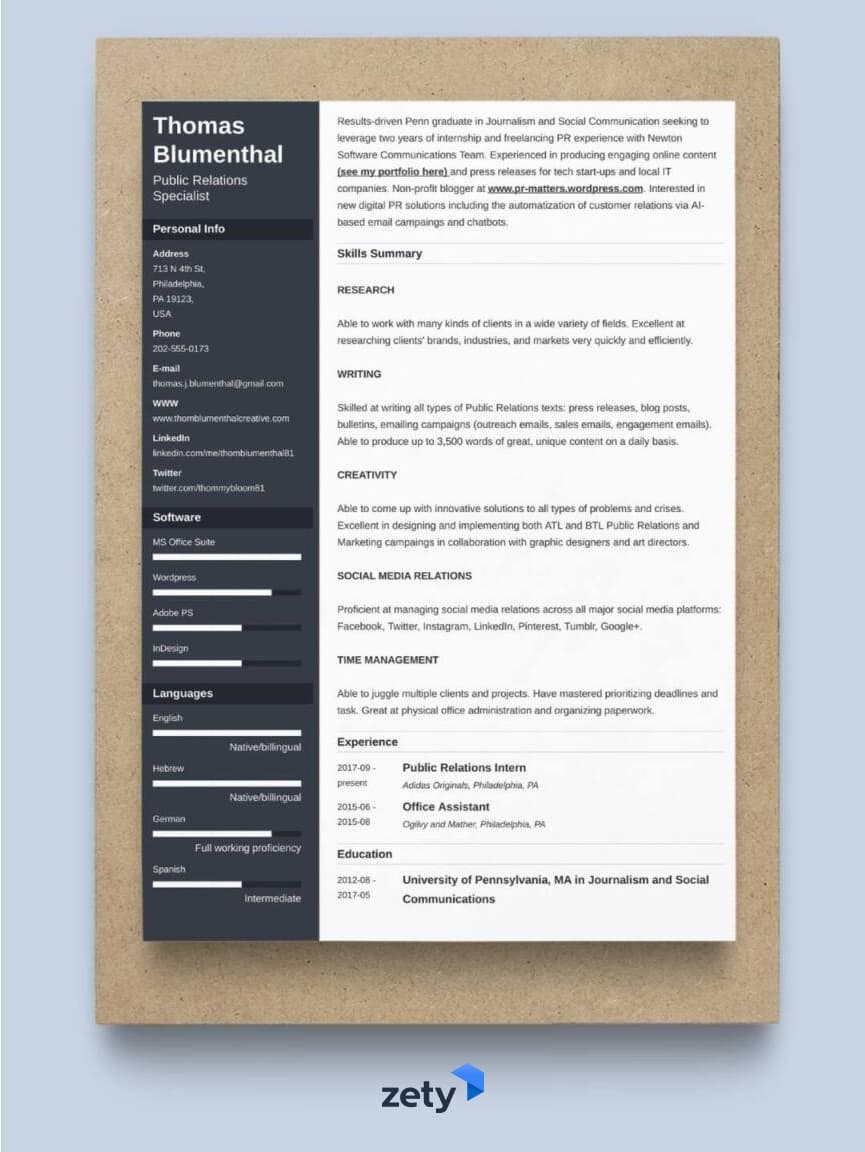
Combination Resume
Combination resume is a hybrid of chronological and functional resume formats (the most flexible). It begins with a summary of skills, then proceeds to the most relevant experience moments.
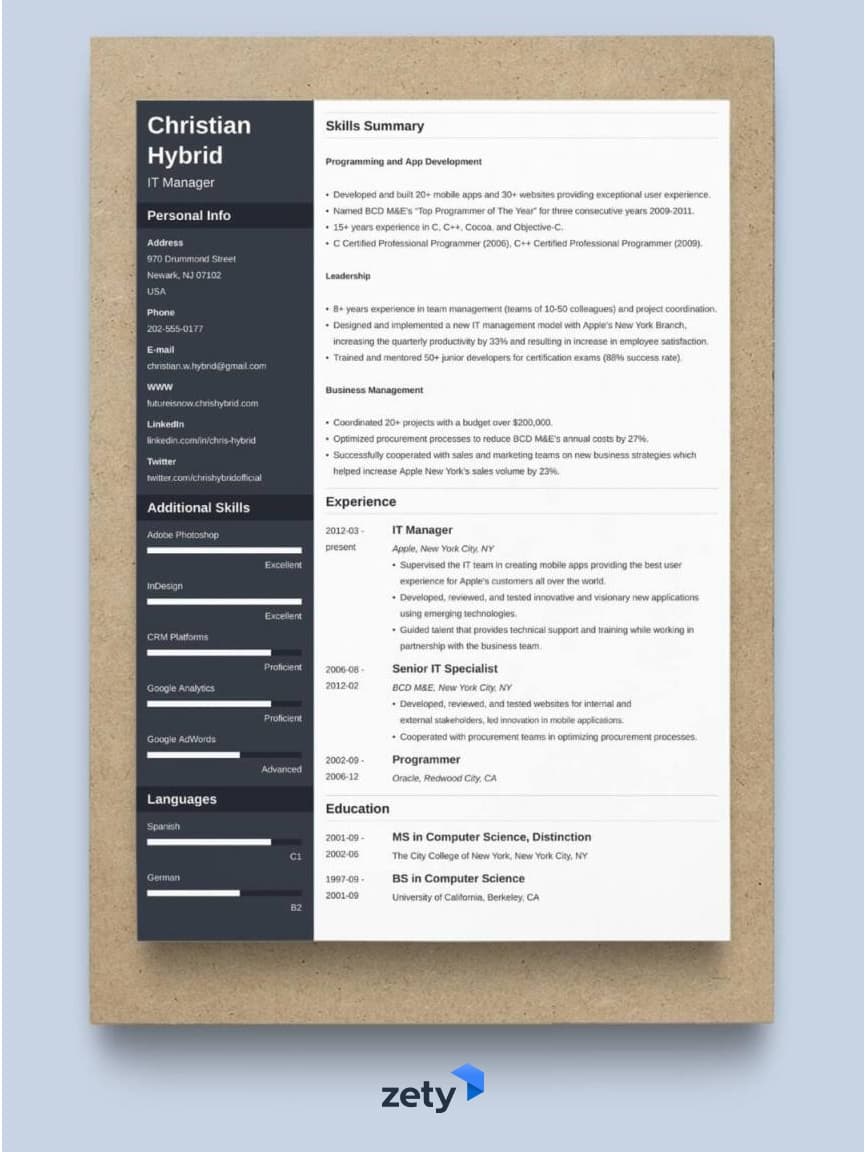
So now you know what a resume looks like. Now let me introduce you to what are the main parts of a resume.
Pro Tip: There are three main resume formats, but there are four main resume types. The last one is targeted resume, which is written for a specific position. Create it by matching the resume keywords referring to skills, qualifications, qualities, and responsibilities listed in the job description. Targeting your resume for a specific job is what truly makes a good resume.
Making a resume with our builder is incredibly simple. Follow our step-by-step guide, use ready-made content tailored to your job and have a resume ready in minutes.
When you’re done, Zety’s resume builder will score your resume and our ATS resume checker will tell you exactly how to make it better.
What to Include on a Resume
Since each corporate job opening attracts an average of 250 resumes, yours needs to be created perfectly. And the best way to do it is to include all the relevant information and highlight them neatly.See what the key sections of a resume are and what to put in your resume:
- Contact information: your name, phone number, email address, and optionally relevant social media handles, such as your LinkedIn profile. In most cases, leave your address off your resume.
- Resume profile: a resume summary or a resume objective, depending on your experience. It tops your resume and serves as your job bio.
- Work experience section: only your relevant work experience. It’s where you tell your career history. This section includes your job titles, company names, duties, and years worked.
- Education section: your school names, academic degrees, major and minors, and optionally your high GPA plus relevant coursework.
- Skills section: job-related skills that may be of value to your prospective employer. Well-crafted key skills sections can boost your chances of getting a job. Always include soft skills and hard skills, and keep in mind that, according to a study, 76% of recruiters prefer the two types of skills separated from one another.
Those resume sections are more than necessary. But you can also list others depending on the job your resume is targeting. Consider adding extra information to your resume as well:
- Certifications and Licenses
- Foreign Languages
- Awards and Honors
- Volunteer Experience
- Hobbies and Interests
- Publications and Research Papers
- Project Descriptions
- Freelance Experience
Pro Tip: No matter what elements you decide to include in your resume or what format will you choose, always aim at creating an ATS-friendly resume. And what resume is that? It’s a document that passes the Application Tracking System (ATS), used by many recruiters to select only the most relevant candidacies.
Plus, a great cover letter that matches your resume will give you an advantage over other candidates. You can write it in our cover letter builder here. Here's what it may look like:
See more cover letter templates and start writing.
Learn more about application documents from our other guides:
- What Is a Curriculum Vitae (CV)?
- CV vs. Resume: The Ultimate Guide
- How to Write a CV?
- Academic CV Template
- What Is a Cover Letter for a Resume?
- Cover Letter Perfect Length
- What Does a Cover Letter Look Like?
- What Is a Short Cover Letter?
- What Is a Letter of Intent?
- What Is a Recommendation Letter?
You know what’s a resume. Now learn how to ace it. Read more: How to Write a Resume
Key Takeaway
Here’s a recap of what you should know before sending your resume to a future employer:
- Your resume is a marketing document. It’s used to make a favorable impression on the recruiter.
- Treat your resume as a summary of your work experience, education, and skills. Be concise and list only key career wins. Plus, be relevant.
- Make your resume aesthetically pleasing. Use the best formatting rules.
- Respect your reader, proofread your resume, and make it high-quality.
What do you think about the resume definition above? Does this brief overview answer your resume questions? Give me a shout in the comments!
About Zety’s Editorial Process
This article has been reviewed by our editorial team to make sure it follows Zety's editorial guidelines. We’re committed to sharing our expertise and giving you trustworthy career advice tailored to your needs. High-quality content is what brings over 40 million readers to our site every year. But we don't stop there. Our team conducts original research to understand the job market better, and we pride ourselves on being quoted by top universities and prime media outlets from around the world.

